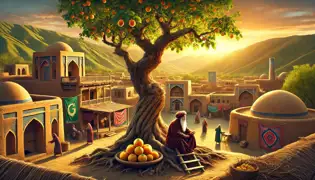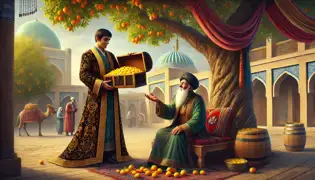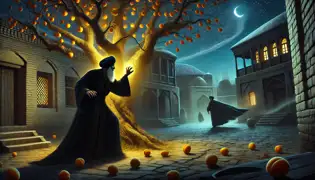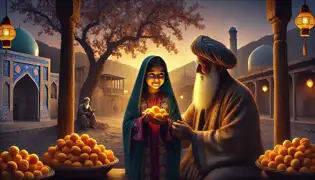Reading Time: 6 min

About Story: The Sage and the Magic Apricot is a Folktale from uzbekistan set in the Ancient. This Poetic tale explores themes of Wisdom and is suitable for All Ages. It offers Moral insights. A legendary apricot, a test of character, and the true price of wisdom.
In the heart of Uzbekistan, where golden deserts stretch beyond the horizon and lush valleys cradle ancient cities, there was once a small village named Nurkent. This village, nestled between the towering mountains and the silk-laden caravan routes of Samarkand, was home to simple farmers, skilled artisans, and wandering storytellers who kept alive the wisdom of ages past.
Yet among them, one man stood apart—not for his wealth or power, but for the depth of his wisdom. His name was Bahram, an old sage who had guided generations with his knowledge of the stars, the seasons, and the human heart. But there was another reason why people sought him out: the legend of the Magic Apricot.
It was said that each year, in the height of spring, the old apricot tree in Bahram’s garden bore a single fruit, unlike any other in the world. Those who tasted it were gifted with great wisdom, unwavering clarity, and the ability to see their true purpose in life. Yet, despite its legendary powers, Bahram never sold it, nor did he gift it carelessly. Instead, he waited—for the one who truly deserved its magic.
This is the story of that apricot, and the people who sought its secrets. In the quiet courtyard behind Bahram’s modest home, an ancient apricot tree stood with its twisted, gnarled roots gripping the earth like the fingers of time itself. This tree was unlike any other in Nurkent. Every spring, when the air grew thick with the scent of blossoming flowers, it bore a single golden apricot, so vibrant that it seemed to capture the very essence of the sun. The villagers spoke of its mystical properties in hushed voices—some believed it could cure any illness, others claimed it could turn the most foolish man into a scholar. But only Bahram knew its true nature. Each year, people from near and far traveled to the village, hoping to be the one worthy of the fruit. Bahram would listen to their stories, weigh their intentions, and decide who would receive it. Some came seeking knowledge, others health, while a few—driven by greed—dreamed only of power. But the fruit had a will of its own. One spring, as the apricot ripened under the warm Uzbek sun, a wealthy merchant named Otabek arrived in Nurkent. Unlike the others who came with humble prayers and quiet reverence, Otabek was different. He did not believe in patience, nor in wisdom freely earned. He believed in gold, and he believed that anything—even the legendary apricot—could be bought. Dressed in rich silks from Bukhara and adorned with rings of polished jade, Otabek approached Bahram’s courtyard with an air of arrogance. He carried with him a chest filled with coins, gold bars, and gemstones that glittered like the sun. “Wise Bahram,” he said, his voice smooth as oil, “I have traveled across deserts and mountains to meet you. I am a man of great wealth and influence. I do not ask for charity; I offer a fair trade.” He gestured to the chest. “Tell me your price for the apricot, and I will pay it tenfold.” Bahram, seated in the shade of his old apricot tree, smiled gently. “Wealth is not the price of wisdom, Otabek,” the old sage said. “The apricot cannot be bought.” The merchant frowned. “Everything has a price, Bahram. You are a wise man, but wisdom without wealth is like a river without banks—it is wasted.” Bahram chuckled softly. “Then tell me, Otabek, if you were to eat the apricot, what would you do with its gift?” Otabek hesitated for a brief moment before saying, “I would use its wisdom to expand my trade empire, to outwit my rivals, and to become the most powerful man in Central Asia!” Bahram’s expression grew solemn. He shook his head. “Then you do not understand its magic at all.” That night, as the village slept, Otabek plotted to steal the apricot, convinced that if he could not buy it, he could simply take it by force. The moon hung low in the sky, casting a silver glow over Nurkent. Otabek crept through the shadows, his heart pounding with anticipation. He had never failed to get what he wanted, and tonight would be no different. As he approached the apricot tree, its leaves rustled as if whispering a warning. The fruit—glowing softly in the moonlight—seemed almost alive. Otabek reached out, his fingers trembling, and plucked the apricot from its branch. At first, nothing happened. He smirked, tucking the fruit into his silk robe. But as soon as he turned to leave, a sudden wind howled through the garden. The apricot turned to dust in his hands, crumbling into nothing. A deep, ancient voice echoed through the night. Otabek’s vision blurred. His mind grew foggy, his thoughts slipping through his grasp like grains of sand. By the time he stumbled out of the garden, he had forgotten who he was. At dawn, the villagers found him wandering the streets, his silk robes in tatters, muttering about a fruit that had turned to dust. His wealth, his ambitions, his identity—gone. Years passed, and spring came again. With it, the golden apricot returned. That year, a young orphan named Amina arrived at Bahram’s doorstep. Unlike the others, she carried no gold, no titles, and no demands. Instead, she came with a question. “Wise Bahram,” she asked, “how does one live a life of meaning?” The old sage smiled. “Tell me, Amina, if you could ask the apricot for anything, what would it be?” Amina thought carefully before answering. “I would ask for the wisdom to help others, the courage to endure hardships, and the kindness to bring joy to those who suffer.” Bahram’s heart swelled with pride. “Then, my child, you have already found what you seek.” That night, under the watchful Uzbek stars, Bahram plucked the golden apricot and placed it in Amina’s hands. When she took a bite, the taste was unlike anything she had ever known—sweet yet bitter, warm yet cool, filled with the knowledge of generations before her. She did not gain riches or power, but something far greater: From that day forward, Amina became Nurkent’s new sage, carrying Bahram’s teachings into the future. Years passed, and when Bahram finally left this world, his garden remained. Each spring, the golden apricot would return, waiting for the next worthy soul. The villagers honored his memory, whispering his teachings through generations, remembering that: And so, the legend of the Magic Apricot lived on, carried by the voices of those who truly understood its secret.The Village’s Greatest Treasure

The Merchant’s Desire
The Thief and the Curse
"The unworthy will never hold the wisdom they do not deserve."

The Humble Seeker
The wisdom to guide others.

The Apricot’s True Gift
True wisdom is not in what we possess, but in what we choose to share.

THE END.

















